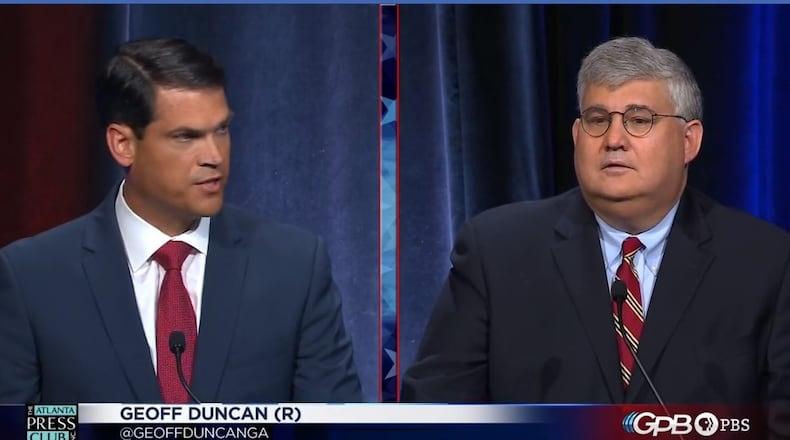The nine-week runoff battle for the Republican nomination for lieutenant governor between former state Rep. Geoff Duncan and state Sen. David Shafer will come to an end when voters cast their ballots July 24.
The winner of next week’s runoff election will face Democrat Sarah Riggs Amico in November.
Background
Duncan: 44 years old; former state House representative from Cumming; attended Georgia Tech; played minor-league baseball; owns a small marketing business and consults with health and construction companies.
Shafer: 54 years old; state senator from Duluth; University of Georgia graduate; investor in several businesses.
Biggest claim to fame
Duncan left Georgia Tech, where he was a star pitcher, early to play minor-league baseball with the Florida Marlins franchise. He played for six years before a shoulder injury forced him to retire from the sport.
Shafer likes to emphasize his long history at the Gold Dome, where he says he's had a role in most major pieces of conservative legislation during his 16 years in office.
Favorite talking points
Duncan: After serving five years in the House, Duncan frequently reminds voters about his outsider, underdog status in the campaign. He's going up against someone with 16 years in public office, and nearly as many working as Republican strategist, and Duncan says he's the one to shake things up.
Shafer: Having worked as a GOP operative for several years before being elected, Shafer likes to say he's amassed a resume that has resulted in hundreds of endorsements from conservative lawmakers and organizations locally and nationally. Endorsements range from the National Rifle Association and Georgia Right to Life to Texas U.S. Sen. Ted Cruz and former state Sen. Rick Jeffares, the third-place finisher in the lieutenant governor's race.
What they don’t want to talk about
Duncan's opponent has launched a website calling him deceptive and a liar for using what the Shafer campaign says is misleading information in speeches and advertisements — some of which have been paid for by a Washington-based political action committee. Duncan repeatedly says he has aggressively campaigned against Shafer because he believes Democrats would attack him even harder in a general election. When asked about Shafer's claims that Duncan is being deceptive, his campaign redirects to what it says are misleading statements Shafer has made.
Shafer's opponent has made a regular talking point out of the dismissed sexual harassment claim against the longtime senator. Shafer has dismissed them as being completely false. The Senate Ethics Committee cleared him of the allegations. Shafer also brushes off implications that he's used public office to make himself rich. He's been repeatedly questioned by opponents throughout the race about where his money comes from, including a call to release his income tax returns from the years he's been in office. Shafer says he's invested in several businesses and has declined to release his taxes.
Who’s funding them?
Duncan is far behind in the money race, collecting about $958,000 as of June 30. The bulk of his money came from in-state donations from individuals. Duncan hasn't spent a lot of time touting campaign endorsements, though a few of his former colleagues, including state Reps. Bert Reeves and David Clark, have given him money.
Shafer's campaign endorsements and contributions read like a who's who of powerful lobbying groups, conservative politicians, and organizations both state and nationwide. He'd racked up nearly $2.5 million in campaign donations as of June 30. Many of Shafer's donations come from within the state, but several of the larger contributions have come from across the country, including Texas-based Titlemax and Pennsylvania-based Comcast.
What they're about to get into and why it matters
The lieutenant governor is the second-highest political position in the state. Whoever fills the office serves as the president of the state Senate, which puts him or her in a position to take a leadership role in shaping the state’s policy. In addition to being instrumental on deciding which pieces of legislation are discussed on the floor, he or she answers parliamentary questions that arise during the debate.
2018 campaign
As part of its coverage of the issues and the candidates in this busy election year, The Atlanta Journal-Constitution this week is offering breakdowns of the races in the July 24 runoff. Look for more at PoliticallyGeorgia.com.
About the Author
Keep Reading
The Latest
Featured



